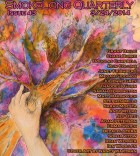Your story is about ghosts, or what the narrator perceives to be ghosts. Because I’m assuming that you’re writing what you know, please tell me about the first pet ghost you ever had as a boy.
My childhood home is adjacent to a cemetery and used to house the nuns of Mercy Hospital before they had on-site quarters, so we had a lot of spiritual activity, lots of ghosts came and went. I wasn’t too aware of any particular ghosts, but my mom says I’m the least psychic member of our family, so maybe that has something to do with it. The closest thing I can think of is a spirit I contacted through a Parker Brothers’ Ouija board when I was in the seventh grade. Every day after school, I sat on my bed with my fingers on the planchette and it would spell out “danger” and nothing else.
One interpretation of ghosts says they are simply beings from another era, they and us coexisting on the same plane because of a rift in the fabric of time, an anomaly caused by unnatural levels of radiation, perhaps even psychic energy. That said, why do you think online pet supply stores keep failing?
Part of the fun of pet stores is looking at other pets. Sometimes I go to Petsmart just to look at dogs. Can’t do that online, except at Petfinder, which seems to be doing alright.
Short short fiction is sexy right now. Some people say that it’s the poetry-like attention to language. Some people say it’s the reward-risk-ratio of being able to experiment at levels not possible in longer works. Others point to climate change. What do you think?
I was resistant to short shorts at first because I didn’t know how to read them. People, especially people in the academy who are taught by older academics, are taught to read fiction in a way that really focuses on plot, structure, or character. Short shorts don’t necessarily have all of those at once, and that’s what I learned to love about the form: its lack of respect for tradition. Maybe that phrasing is too strong. Short shorts give readers lots of room and some time away from rigorous analysis and interpretation. I think everything you mentioned in the question factors in, but I also think, as a reader and writer, short shorts are fun.
You’re on a desert island, stranded, but you knew it was going to happen and you had time to pack. What are the five verbs that start with letter V that you bring with you and why?
Ventilate—I appreciate a nice breeze.
Vaccinate—It is important, for yourself and others, to be vaccinated.
Vex—I spend most of time vexed. I wouldn’t know what to do with myself without vexation.
Vasodiliation—Because I hear this can help with headaches.
Vilify—Because I’m going to make an enemy of something.
Please complete the following Mad Lib:
My [pre-1970 make of automobile] broke down in [a city in Bulgaria] because I [one of your V verbs, past tense] my [a body part] and had to go to the hospital, where I used all of the money I earned working at [your favorite chain hardware store] the summer before I failed at [your lifelong dream]. I spent [a number] days at a mechanic’s flat, where he lent me two [an item of clothing], six [a root vegetable], and the largest pile of [some kind of tchotchke] I’d ever seen. While living with the mechanic, I became an expert at [your second-favorite board game], then used the [the tchotchke] to buy passage to [a city in South America], where I met the ghost of [your favorite saint] who [something people do] obsessively and religiously, which reminded me of a [a type of extinct animal], not to mention [a baseball Hall of Fame pitcher], [a sex act], [your least favorite John Goodman movie], and large curd cottage cheese.
My Morris Minor broke down in Gorna Oryahovitsa because I vasodilated my lower eyelid and had to go to the hospital, where I used all of the money I earned working at Ace Hardware the summer before I failed at opening a haunted ice cream parlor. I spent 13 days at a mechanic’s flat, where he lent me two Better than Ezra T-shirts, six pignut roots, and the largest pile of singing Snoopy salt shakers I’d ever seen. While living with the mechanic, I became an expert at Carcasonne, then used the singing Snoopy salt shakers to buy passage to Tierra Del Fuego, where I met the ghost of Saint Dymphna who mouth-breathes obsessively and religiously, which reminded me of an Irish Elk, not to mention Lefty Grove, rusty trombones, True Stories, and large curd cottage cheese.



 The core workshop of SmokeLong Fitness is all in writing, so you can take part from anywhere at anytime. We are excited about creating a supportive, consistent and structured environment for flash writers to work on their craft in a community. We are thrilled and proud to say that our workshop participants have won, placed, or been listed in every major flash competition. Community works.
The core workshop of SmokeLong Fitness is all in writing, so you can take part from anywhere at anytime. We are excited about creating a supportive, consistent and structured environment for flash writers to work on their craft in a community. We are thrilled and proud to say that our workshop participants have won, placed, or been listed in every major flash competition. Community works.